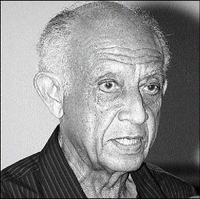
Baugh
The Department of Literatures in English at The UWI, Mona, presents the third lecture in the Edward Baugh Distinguished Lecture Series on Sunday, November 29 at Philip Sherlock Centre for the Creative Arts, beginning at 11 a.m. The lecture will be delivered by Canada Research Chair in Globalisation and Cultural Studies at the University of Manitoba and director of the Research Centre for Globalisation and Cultural Studies, Professor Diana Brydon. Her lecture is entitled, 'Metaphors that disturb and inspire: the challenge of reading across cultures'.
The lecture series honours critically acclaimed poet Edward Baugh, who is professor emeritus of English at the UWI, Mona. Baugh has garnered an international reputation as an authority on Anglophone Caribbean poetry in general and on the work of Derek Walcott in particular.
distinguished record
His distinguished record of academic, administrative and public service includes a lengthy stint as the public orator of UWI, Mona (1985-2002), three terms as head of the Department of English, and dean and vice-dean of the Faculty of Arts and General Studies. He has figured prominently as a leader in national, regional and international literary and academic associations such as Jamaica P.E.N Club, West Indian Association for Commonwealth Literature and Language Studies and the Association for Commonwealth Literature and Language Studies. He has adjudicated regional and international literary competitions and prizes such as the Guyana Prize for Literature and the Commonwealth Writers Prize.
Professor Brydon has been Canada Research Chair in Globalisation and Cultural Studies at the University of Manitoba and director of the Research Centre for Globalisation and Cultural Studies since 2006. She was the first Robert and Ruth Lumsden Chair of English at the University of Western Ontario from 1999 to 2006 and has taught at universities in Australia, Brazil and Canada. Several of her articles have been translated into Chinese, Portuguese and Polish.
A specialist in postcolonial cultural studies and Australian, Canadian and Caribbean literary studies, she has published numerous articles and book chapters in these fields and books on Christina Stead (1987) and Timothy Findley (1995, 1998). She co-wrote Decolonising Fictions with Helen Tiffin and edited a groundbreaking interdisciplinary, five-volume anthology, Postcolonialism: Critical Concepts in Literary and Cultural Studies (2000). Her co-edited book with Irena Makaryk, Shakespeare in Canada (2002), crosses theatre, literary and cultural studies, Canadian and postcolonial studies to provide the first book on this important topic.
Caribbean climate change: Its effect on our lives
Tourism, agriculture, energy use, water and health are important to all of us in the Caribbean. They influence our ability to earn money, feed ourselves and enjoy a reasonable standard of living. These areas are affected by several factors, one of which is climate.
Because climate has the ability to affect the way we live, a team of scientists called the Climate Studies Group, Mona, is examining how Caribbean climate is changing and the impact of climate on these important areas of our lives. Funded by CARICOM Climate Change Centre and other international agencies, the scientists already have a better understanding of what makes one year wet and cool and another hot and dry.
In the past, Jamaica and the Caribbean, both in the daytime and at night, enjoyed cooler temperatures. Even when the days were hot, we could look forward to cooler nights.
Now, scientists have observed that the days are hot and the nights are also hot.
Also changing are the intensity and duration of rainfall across the island and the Caribbean. Today, we experience far greater extremes in rainfall events, e.g. floods and droughts.
global warming
The team is also studying how global warming, the rise in temperature generally experienced around the world, will change the climate of the Caribbean region and hence our lifestyle.
Global warming may cause up to a 4C rise in the temperature across the Caribbean region. This rise could result in drier conditions particularly during the early part of the rainy season.
Global warming may also cause more intense hurricanes to pass through the Caribbean.
The scientists have collected data which suggest increased incidence of dengue fever in the Caribbean and a globally warmed world.
They also expect changes in the amount of water flowing in our rivers in Jamaica.
consequences
Now that we can project with more certainty how the climate may change, governments, businesses, farmers, hospitals, schools and the man in the street can be better prepared for the consequences of climate change.
As the information reaches to everybody, we all can play our part in minimising or taking advantage of the effects of climate change.
Dr Michael Taylor is a senior lecturer in the Department of Physics, UWI, Mona, and currently heads the Climate Studies Group, Mona. He is an expert in climate variability and change which he has been researching for several years. Other members of the team include Dr Tannecia Stephenson and Professor Anthony Chen, member of the Intergovernmental Panel on Climate change which was jointly awarded the Nobel Peace Prize in 2007.